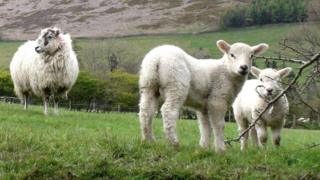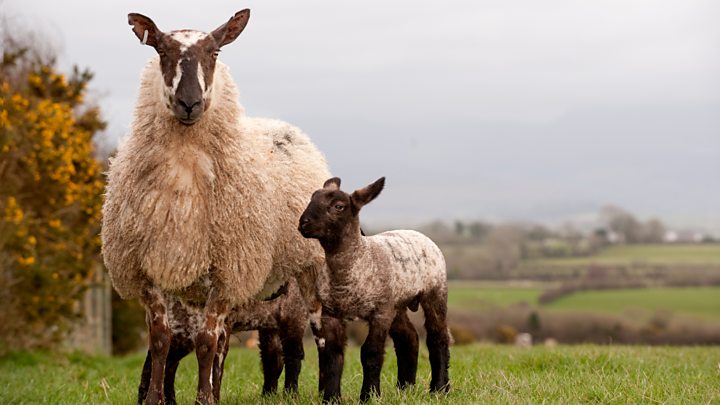‘No room’ for excess meat in no-deal Brexit

Image copyright
PA Media
Government plans to buy up hundreds of thousands of tonnes of unsold lamb in the event of a no-deal Brexit could be unworkable because there is nowhere to store it, BBC Newsnight has learned.
The reported plan suggested excess meat would be bought at the point of slaughter.
But figures from the industry body which represents businesses that store frozen and chilled food show they are at capacity and “full to bursting”.
Prime Minister Boris Johnson maintains that a no-deal Brexit is not his aim.
Mr Johnson said on Tuesday: “We are not aiming for a no-deal Brexit and I don’t think that’s where we are going to end up.”
Speaking on a visit to a poultry farm near Newport, Mr Johnson insisted he was focused on trying to achieve a new agreement. He acknowledged that British agriculture would need support in the event of no-deal and said ministers were already working on a package of financial support.
‘We’ll make sure they have the support they need,’ he said. ‘If their markets are going to be tricky, then we will help them to find new markets. We have interventions that are aimed to support their incomes.’
The Cold Chain Federation’s chief executive, Shane Brennan, told Newsnight the plan could see a return to “the milk lakes, and butter mountains produced by the EU in the 1980s”.
“No-one in government has spoken to the industry about where they’ll put the lamb if they buy it,” he added.
- Can farmers send lamb to Japan after Brexit?
- No-deal Brexit ‘would cause civil unrest’ in rural areas
The plan, which was reported in a number of newspapers, was drawn up by Michael Gove, the former environment secretary, who is now in charge of Whitehall’s no-deal Brexit planning.
Under the proposal, the government would set aside £500m to buy excess lamb and beef at a predetermined price.
About 35-40% of British lamb is exported and more than 90% of that is sold to the EU. That is roughly £350m worth of lamb each year. A proportion of this is made up of cuts of meat that are not widely eaten in the UK.
Currently, British farmers do not face tariffs when selling into Europe, but in the event of a no-deal Brexit the same products would have tariffs of between 40% and 50% applied.
That would make them much more expensive and less attractive to European buyers, leading to fears the market for British lamb on the European mainland would collapse, forcing some British farmers out of business.
Although the plans are unconfirmed, Mr Johnson said on Tuesday: “We have interventions that are aimed to support their [British sheep farmers’] incomes.”

Media playback is unsupported on your device
However, purchasing unsold carcasses at the point of slaughter could cause problems if there is nowhere to store the meat.
Cold storage businesses estimate they will be at 96% capacity by September this year. Cold storage warehouses are generally thought to be full when they reach 95%, because of the need to move around in the space.
“We have been full since September 2018. We’ve gone past full and we’re going to be more than full,” said Mr Brennan.
He added that capacity could not be increased quickly, because planning and building a new cold-storage warehouse takes about three years.
“This policy appears to be a return to the bad old days of production subsidies,” he said.
The EU subsidies which encouraged farmers to overproduce, irrespective of consumer demand, resulted in vast milk lakes and grain and butter mountains in the 1980s and were finally dropped in 2003.
You can watch Newsnight on BBC Two weekdays at 22:30 or on iPlayer, subscribe to the programme on YouTube and follow it on Twitter.

